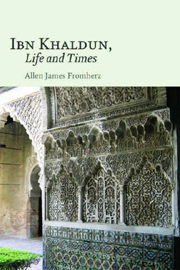6 - MODERNITY
Published online by Cambridge University Press: 12 September 2012
Summary
Il faut Manger!
Habib Bourguiba (d. 2000 ad)IBN KHALDUN AS A MODERN MYTH
Ibn Khaldun's face appears prominently on that heavily used unit of Tunisian currency: the 10 dinar note. His statue occupies center stage on the main Avenue Bourguiba in the capital, Tunis. The Ibn Khaldun Hotel is a landmark building in the city. A popular Tunisian stamp features his image: he is framed by traditional Tunisian architectural motifs and seems to look confidently into the future. He represents continuity between tradition and innovation. He represents Tunisia's modern, national ambitions: the pursuit of innovation that simultaneously preserves an authentic Tunisian identity. His name adorns innumerable institutes, government buildings, and schools, not only in Tunisia, but also throughout the Islamic world. It may at first seem ironic that this fourteenth-century author of a universal history should himself come to embody the universal claims of a modern nation. Indeed, the universalism of Ibn Khaldun seems to be unique among historical figures represented by the modern, Islamic state. Ibn Khaldun is unlike other famous medieval or even early Islamic figures, such as Ibn Rushd or Ibn Sina, whose names seem most appropriate for specific venues, hospitals, or clinics associated with their most famous work. Ibn Khaldun, however, seems to have been universalized as appropriate for nearly any place, situation or venue. His name is conveniently appropriate for almost any situation that calls for some sort of intellectual or social authenticity.
- Type
- Chapter
- Information
- Ibn KhaldunLife and Times, pp. 149 - 164Publisher: Edinburgh University PressPrint publication year: 2010



